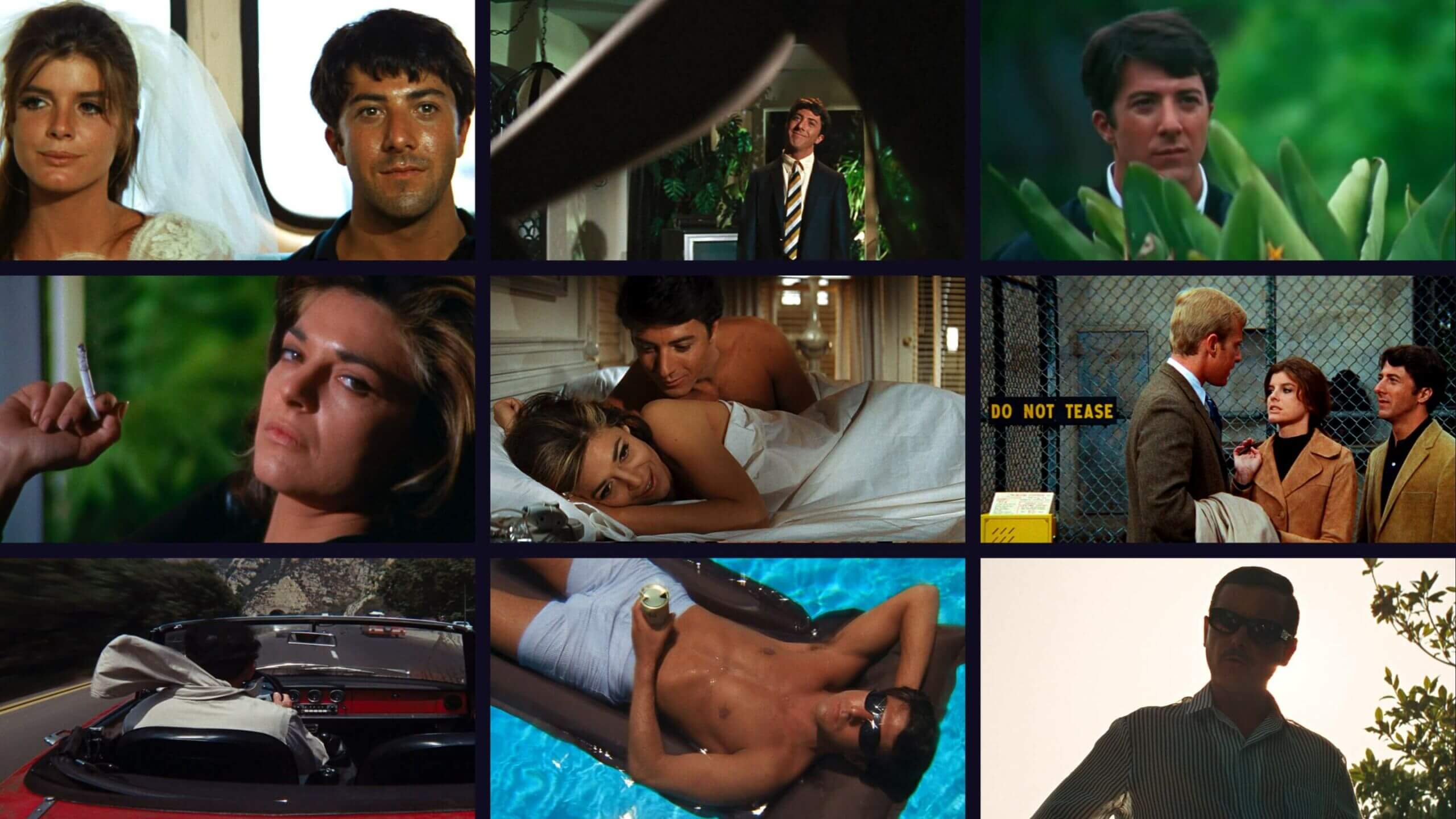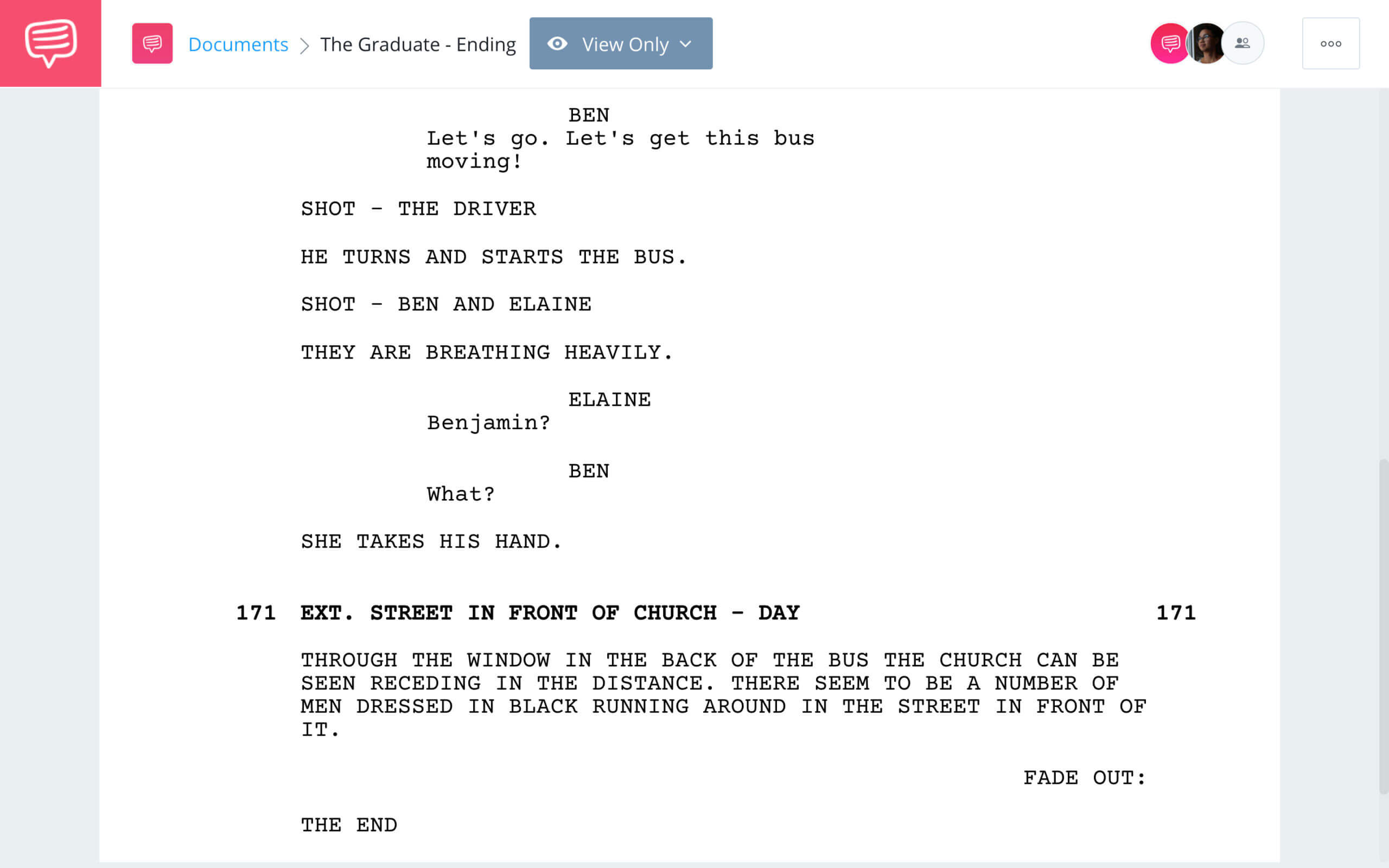Few film endings are as iconic and impactful as the unforgettable resolution to The Graduate. Be sure to watch our video essay below for a full breakdown of The Graduate ending scene, then read on for further analysis. We’ll be digging into the four factors that culminate in the film’s ending being as effective as it is: writing, build-up, music, and spontaneity. This is — The Graduate ending explained. But first, let’s examine how screenwriter Buck Henry and director Mike Nichols crafted a scene that penetrated the zeitgeist and remains just as poignant and relevant today.
The Graduate ending explained
The cultural impact of the ending
Since the film’s release in 1967, The Graduate’s ending scene has remained a pop culture touchpoint. It’s a finale so iconic that it has been referenced, spoofed, and parodied in everything from The Simpsons to Archer.
The Graduate bus scene parodied on The Simpsons
Being referenced so often in other media helps to prolong the lifespan of The Graduate’s ending and speaks to how special the ending truly is. Here's another homage — a nearly shot-for-shot remake in Wayne's World 2.
Wayne’s World 2’s extended spoof of The Graduate ending scene
More than 50 years in the cinematic zeitgeist is quite the accomplishment. So, how did director Mike Nichols and the rest of the creative team behind The Graduate craft such an unforgettable ending? It all starts with the writing.
Understanding how to end a story starts by examining different types of endings. Not only endings are the same and each type has a clear purpose that needs to be baked into the story from page 1.
The Graduate ending meaning
Writing The Graduate ending scene
The story of The Graduate first appeared in novel form in 1963. The book of the same name — written by Charles Webb — was a self-described “novel of today’s youth, unlike any you have read.”
This focus on contemporary youth was a major factor in the novel’s success and a big part of why the themes of the novel and the subsequent film resonated so deeply with audiences. Webb was just 24-years-old at the time of the novel’s publication, and parts of the story were inspired by his own life. So, apparently, he was the perfect candidate to give voice to his generation’s internal struggles and sense of aimlessness.
When it came time for the film adaptation, Webb had no interest in writing the screenplay. In fact, he was committed to living a “non-material lifestyle” which meant he accepted only a small one-time payment for the film rights and never earned a penny more after the film’s massive success.
Throughout his life, Webb routinely avoided opportunities for financial windfalls and instead donated most of his worldly possessions and lived out of a VW bus for much of his life.
Here's screenwriter Buck Henry on how he got tasked with adapting Webb's novel, his particular approach, and working with Nichols. This entire interview is worth watching but skip to 1:02:00 for his discussion of The Graduate.
Writer Buck Henry on adapting the novel
For a closer look at the script, we imported it into StudioBinder's screenwriting software. Here's how The Graduate bus scene was written. You'll notice right away that the finished film didn't end exactly how it was written. Follow the image link to read the entire scene.
The Graduate Movie Ending • Read the Entire Scene
If you are interested in learning how to write an adaptation, check out our guide on the subject. With Mike Nichols in the director’s chair, a few different screenwriters took a crack at adapting The Graduate, most notably Buck Henry and Calder Willingham, who share screenwriting credit on the film.
Though the two wrote separate drafts of the script independently of each other, elements from both drafts were used by Mike Nichols as he zeroed in on the best film adaptation of the novel possible.
Related Posts
The Graduate wedding scene
The build-up before the let-down
Part of what makes the slow and somber silence of the ending hit so hard is the flurry of build-up that directly precedes it in The Graduate wedding scene.
The fastest, most action-packed sequence of the film leads straight into the slowest and quietest. This juxtaposition of energies magnifies the crushing weight of the ending. The pace of the film winding down mirrors the adrenaline leaving Benjamin and Elaine’s bodies as the realization of what they’ve just done begins to fully set in.
For a refresher on the complete ending sequence of The Graduate, refer to the storyboard built in StudioBinder's storyboard creator. Follow the image link to explore the entire sequence — from the race to the church, to the narrow escape via public bus.
The Graduate wedding scene • See the Entire Storyboard
Though this final moment on the bus is certainly quiet, it isn’t quite silent, because of the next element that contributes to this ending’s effectiveness.
THE GRADUATE ENDING SONG
How the music changes the scene
The Simon and Garfunkel soundtrack used throughout The Graduate has a life of its own outside of the film, both before and after its release. Although the songs perfectly fit the feel and themes of the film, they were not actually written for the movie.
Mike Nichols initially approached Simon and Garfunkel to create original music for the film, but throughout the process, the trio discovered that existing tracks and works in progress fit the film like a glove.
If you’re interested in using pre-existing music in one of your projects, you will have to learn all about music licensing.
Paul Simon discusses creating the soundtrack • The Graduate final scene
The ending on the bus is made all the more poignant through the use of The Sound of Silence layered over the visuals. It cannot be stressed enough just how important the music is in this moment, especially when you remember that this is not the first time we have heard this particular song in the film.
The Sound of Silence is a recurring motif from earlier in the film, used when Benjamin was aimless and searching for meaning, clueing us in that he remains just as lost even after making such radical change.
The graduate ending explained
Spontaneity and letting the shot linger
The final element that contributed to the ending becoming as iconic as it is today is perhaps the most important, because without a willingness to pursue spontaneity, this ending would never have existed in its final form.
Luckily, Mike Nichols approaches directing with an open-mind and a willingness to explore the material. Watch this interview with Nichols discussing his entire career, including The Graduate, and you'll quickly learn what a thoughtful and intuitive director he is.
Mike Nichols discusses directing • The Graduate final scene
The novel and screenplay both would have seen the film ending in a far more conventional manner. The original ending would have closed out the film on a visual gag and with Benjamin and Elaine still elated with their act of rebellion as they elope.
Instead, Mike Nichols decided to let his camera linger for a few moments longer and watch the joy and hope fade from their faces. It was an idea that sprang up on set in the middle of shooting and that perfectly reinforced the overall themes of the film. Cinematic magic captured in the moment led to one of the most iconic movie endings of all time.
UP NEXT
A History of "New Hollywood"
Those were four key elements that contributed to The Graduate ending being as impactful and long lasting as it has proven to be. Alongside Bonnie and Clyde, The Graduate helped to usher in the era of New Hollywood. Learn all about the history of the New Hollywood movement, the directors behind it, and the films that shaped a generation.


